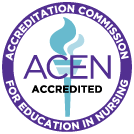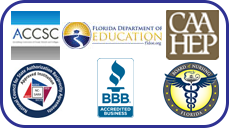Treat the whole patient. More direct care with your patient.
A Family Nurse Practitioner (FNP) manages patients and health care systems with increasing levels of complexity, strategically solve clinical problems, establish best practices and direct evidence-based practice. Additionally, they resolve legal and ethical dilemmas in various clinical settings.
The FNP will advance his/her knowledge and skill in diagnostic reasoning, effective communication, quality improvement, technology and ethical decision making in a rapidly changing health care industry. The FNP will demonstrate the ability to; monitor and alter drug therapies according to state regulations, initiate appropriate according to established protocols and consistent with the practice setting. In addition, the FNP will develop effective financial and organizational management skills methods of health care services for a diverse patient population across the life span.
Why you should earn your Master of Science in Nursing, Family Nurse Practitioner at ICHS?
Our program mission is to develop professional advance practice nurses for the success of best practices in health care systems. The Family Nurse Practitioner program promotes the advancement of nursing knowledge and practice through an innovative, patient-centered program. The curriculum is relevant and visionary in addressing the current issues and trends of a global society while encouraging continued professional growth. Students are education to be ethical, accountable, and responsible graduates who will become leaders in a changing healthcare environment.
How Will Being a Family Nurse Practitioner Prepare Me for the Future?
The core objectives of the Master of Science Degree in Family Nurse Practitioner is to move students beyond basic nursing skills to advanced pathophysiology, pharmacology, critical thinking, leadership, and management and research skills. The program will provide excellent educational background so that its graduates are able to successfully and proficiently:
- Exhibit ethical principles that demonstrate interactions with patients/clients, healthcare professionals, and the public;
- Integrate advanced practice skills to meet the patient’s/client’s physiological, psychological, sociocultural and developmental needs;
- Collaboratively appraise ethical, legal, economic, and political factors that affect the management of healthcare for individuals, families, and communities;
- Incorporate community resources to meet primary, secondary, and tertiary healthcare needs for individuals, families, and communities;
- Utilize quality, cost effective nursing practice principles and function as a leader and advocate of healthcare policy, organization, and healthcare finance;
- Be prepared for a leadership role within the scope of advanced practice nurse;
- Critique research findings and incorporate research into practice based on the best practice model;
- Engage in health promotion, disease prevention, and maintenance of function across the health-illness continuum;
- Participate in activities that support the profession of nursing.

The Master’s Nursing program at International College of Health Sciences located in Boynton Beach, Florida, is accredited by the:
Accreditation Commission for Education in Nursing (ACEN)
3390 Peachtree Road NE, Suite 1400 Atlanta, GA 30326
(404) 975-5000
The most recent accreditation decision made by the ACEN Board of Commissioners for the Master’s Nursing program is initial accreditation.
View the public information disclosed by the ACEN regarding this program on the ACEN website.
PROGRAM DESCRIPTION
Master of Science in Nursing Family Nurse Practitioner
- 40 semester Credits;
- 24 Months Full-Time;
- 30 Months Part-Time.
The Family Nurse Practitioner (FNP) program is designed to expand the knowledge of the nurse as it relates to the role of the family nurse practitioner and advanced nursing practice. Family nurse practitioners serve as the primary health care providers in many diverse practice settings including, but not limited to, private medical offices, health clinics and acute care settings. The Family Nurse Practitioner program integrates theory and practical application through lecture, laboratory, and clinical experiences to address a wide range of primary care needs, order diagnostic tests, apply evidence-based research when caring for the family and manage common acute, chronic health problems of individuals from infancy through late adulthood. The FNP program focuses on developing the knowledge and skills necessary to deliver nursing care to persons of all ages across primary care settings. This program prepares the successful and licensed graduate for an entry level position as an advanced practice nurse.
Upon completion of the graduate program, the graduate will be able to:
- Integrate nursing and related sciences into the delivery of care to clients across diverse healthcare settings;
- Create effective interdisciplinary organizational and systems leadership in the care of the client in diverse healthcare settings;
- Analyze quality initiatives to improve health outcomes across the continuum of care;
- Apply practice guidelines to improve practice and health outcomes;
- Relate information and communication technologies to document and improve health outcomes;
- Examine the effect of legal, ethical, and regulatory processes on healthcare delivery, practice, and health outcomes;
- Employ collaborative inter-professional strategies for improving client and population health outcomes;
- Evaluate the effectiveness of clinical prevention interventions that affect individual and population-based health outcomes, perform risk assessments, and design plans or programs of care;
- Relate knowledge of illness and disease management to providing evidence-based care to clients, communities, and vulnerable populations in an evolving healthcare delivery system.
DEGREE PLAN
Program Outline
| COURSES | CREDITS | ||
|---|---|---|---|
| NUR5018: Advanced Pathophysiology | 3 | ||
| NUR5024: Advanced Health Assessment and Diagnostic Reasoning | 4 | ||
| NUR5028: Advanced Concepts in Pharmacology | 3 | ||
| NUR5046: Evidence Based Practice | 3 | ||
| NUR6010: Primary Health Care of the Family I - Adults and Geriatrics | 6 | ||
| NUR6024: Primary Health Care of the Family II - Women’s Health | 3 | ||
| NUR6042: Primary Health Care of the Family III - Pediatrics and Adolescents | 3 | ||
| NUR6080: Advanced Practice Practicum I | 6 | ||
| NUR6090: Advanced Practice Practicum II | 6 | ||
| NUR6091: Family Nurse Practitioner Integration | 3 | ||
| TOTALS | 40 | ||
TECHNICAL STANDARDS
Essential Functional Abilities
The student’s health must enable him/her to fulfill the requirements and outcomes of the nursing program. International Colleges of Health Science’s nursing program requires the following as functional abilities for nursing students.
| CATEGORY | DESCRIPTION |
|---|---|
| Gross Motor Skills | Gross motor skill sufficient to provide the full range of safe and effective nursing care activities, such as moving within confined spaces, standing, and maintaining balance, reaching above shoulders (IV poles), reaching below waist (plug electrical appliance into wall outlets). |
| Fine Motor Skills | Fine motor skills sufficient to perform psychomotor skills, such as picking up objects with hands, grasping small objects with hands (IV tubing, pencil), writing with pen or pencil, keying/typing (use a computer), Pinching/picking or otherwise working with fingers (manipulate a syringe, eye droppers). |
| Physical Endurance | Physical stamina sufficient to perform client care activities for entire length of work role, such as standing during surgical or therapeutic procedures, sustaining repetitive movements (CPR), maintaining physical tolerance (work entire shift). |
| Physical Strength | Physical strength sufficient to perform full range of required client care activities, such as pushing and pulling 25 pounds (position clients), supporting 25 pounds of weight (ambulate client), lifting 25 pounds (pick up a child, transfer client), moving light objects weighting up to 10 pounds (IV poles), defending self against combative client, using proper upper strength (perform CPR, physically restrain a client), squeezing with hands (operate fire extinguisher). |
| Mobility | Physical abilities sufficient to move from place to place in a quick manner and to maneuver by twisting, bending, Stopping/squatting, moving quickly (response to an emergency), climbing (ladders/stools/stairs), walking. |
| Hearing | Auditory ability sufficient for physical monitoring and assessment of client health care needs, which includes hearing normal speaking level sounds (person-to-person report), hearing faint body sounds (blood pressure sounds, assess placement of tubes), hearing in situations when not able to see lips. |
| Visual | Visual ability sufficient for accurate observation and performance of nursing care, which includes seeing objects up to 20 inches away (information on a computer screen, skin conditions), seeing objects up to 20 feet away (client in a room), seeing objects more than 20 feet away (client at end of hall), use depth perception, use peripheral vision, distinguish color (color codes on supplies, charts, bed), distinguish color intensity (flushed skin, skin paleness). |
| Tactile | Tactile ability sufficient for physical monitoring and assessment of health care needs, which includes feeling vibrations, detecting temperature, and feeling differences in surface characteristics, sizes, and shapes. |
| Smell | Olfactory ability sufficient to detect significant environmental and client odors. |
| Reading | Reading ability sufficient to comprehend the written word at a minimum of a tenth-grade level. |
| Arithmetic | Arithmetic ability sufficient to do computations at a minimum of an eight-grade level. It includes the following three concepts: Counting: the act of enumerating or determining the number of items in a group. Measuring: the act or process of ascertaining the extent, dimensions, or quantity of something. Computing: the act or process of performing mathematical calculations such as addition, subtraction, multiplication, and division. |
| Emotional Stability | Emotional stability sufficient to assume responsibility/accountability for actions, which includes establishing therapeutic boundaries, dealing with the unexpected, adapting to a changing environment/stress, focusing attention on a task, performing multiple responsibilities concurrently, and handling strong emotions. Analytical/thinking/reasoning skills sufficient to perform deductive and inductive thinking necessary to make nursing decisions, which includes transferring knowledge from one situation to another, processing information, problem solving, evaluating outcomes, prioritizing tasks, and using short- term and long-term memory. |
| Critical Thinking Skills | Critical thinking skills sufficient to exercise sound nursing judgment, which includes identifying cause-effect relationships, planning/controlling activities for others, synthesizing knowledge and skills, and sequencing information. |
| Interpersonal Skills | Interpersonal abilities sufficient to interact with individuals, families, and groups respecting social, cultural, and spiritual diversity. This includes the ability to negotiate interpersonal conflict, respect differences in clients, establish rapport with clients, establish rapport with coworkers. |
| Communication Skills | Communication abilities sufficient for interaction with others in written and oral form, which includes teaching, explaining procedures, giving oral reports, and conveying information through writing. This includes the ability to teach (client/family about health care), explain procedures, give oral reports (report on client’s condition to others), interact with others (heath care workers), speak on the telephone, Influence people, direct activities of others, convey information through writing (progress notes). |
| Analytical Thinking | Reasoning skills sufficient to perform deductive/inductive thinking for nursing decisions. |
This list was developed from The National Council of State Boards of Nursing, Inc. list of essential functional abilities.
PROGRAM DISCLOSURES
Program Outcomes: Consumer Information ![]()
Licensure Requirements:
ICHS (International College of Health Sciences) cannot determine whether its nursing program meets licensure requirements in each student’s state of residence; therefore, we are providing a link to the American Association of Nurse Practitioners NP Practice information by State: https://www.aanp.org/practice/practice-information-by-state







